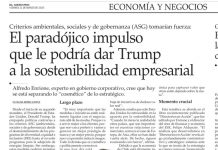Autores: Taekjin Shin and Jihae You
Ver paper completo haciendo click aqui
Research Question/Issue
The present study examines how temporal consistency in the CEO’s use of language in public documents affects the board’s decision to dismiss the CEO.
Research Findings/Insights
Using CEOs’ letters to shareholders from 304 large firms in the United States in 1998‐2007, we found that CEO dismissal risk is lower when the CEO consistently uses language that signals conformity to a prevailing institutional logic: shareholder value orientation. In contrast, dismissal risk is greater when the CEO consistently displays language that signals stakeholder orientation, an alternative institutional logic.
Theoretical/Academic Implications
The present study contributes to signaling theory by incorporating a temporal dimension into the existing literature. Our findings highlight the importance of strategic actions taken by corporate leaders, suggesting that a CEO’s desire to circumvent dismissal by courting shareholders helped institutionalize the shareholder value logic. The findings shed light on stakeholder management research by demonstrating that a one‐time gesture is not sufficient to gain support from stakeholders who value long‐run consistency in message. Finally, the present study extends CEO dismissal research by highlighting the importance of signaling and cognitive processes in the board’s decision regarding CEO dismissal.
Practitioner/Policy Implications
The present study provides insights to corporate executives who communicate with various stakeholders and to board members who make decisions about CEO retention and dismissal. The findings may also be useful for policy makers who design regulations about corporate communications and disclosures.












